With dozens of review sites like Google providing individuals with the chance to give their feedback on any product or business, knowing how to remove negative reviews can be a valuable asset. Of course, companies that remove bad reviews, like NetReputation, can provide this service. First, though, it helps to understand why you should remove negative reviews, plus alternatives that can help your business.
Reviews about your company are critical to your success. They also can play a big role in your failure.
Even one negative Google review can tarnish your company’s reputation permanently. That’s why it’s important to establish a positive internet reputation and promptly respond to customer feedback and reviews.
Also, know this: Responding to a one-star review may not be enough to undo the damage. Sometimes, the best option is to delete Google reviews that are negative and replace them with several positive ones.
Unfortunately, the process of removing a negative online review can be time-consuming and confusing. In many cases, hiring a professional review manager is the best path, allowing you to focus on the business itself instead of review management.
NetReputation’s team of review management experts can help you protect your online reputation. With our negative reviews removal services, we combat the false reviews and unflattering ratings that can damage your business prospects. Additionally, our team can give you the tools to better control what others are saying about you online.
How Negative Reviews Affect Your Online Reputation
It should come as no surprise that negative reviews can dramatically affect how you or your business is perceived. An inappropriate review or negative review may appear in the top search results on search engines like Google or Bing. This type of prominent visibility means that potential customers are more likely to see unflattering customer comments and poor reviews before they get to positive ones.
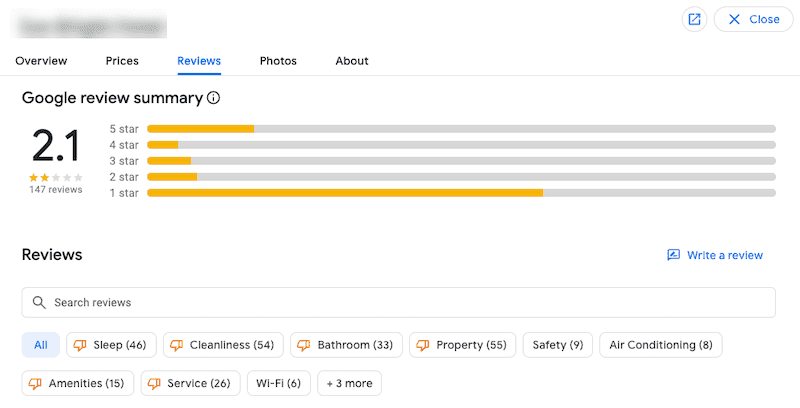
When negative ratings or remarks surface on Google, it can feel like a personal attack. But while it’s never fun to be criticized online, paying attention to bad reviews is necessary. By responding, you can transform a negative experience into a positive one.
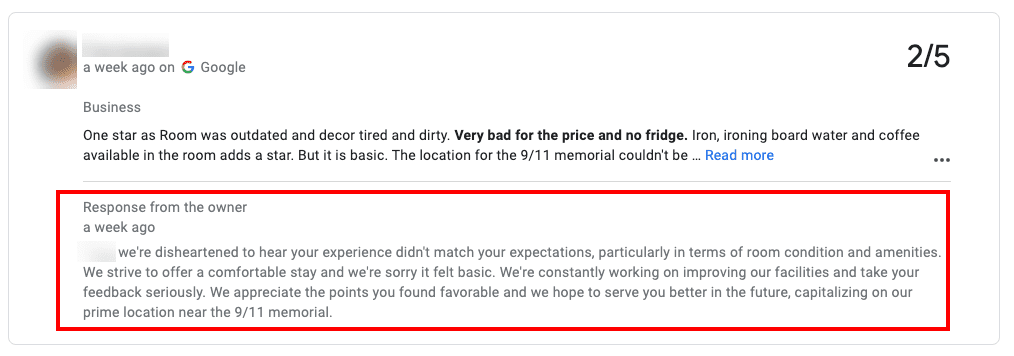
In fact, taking the time to respond to any review, both positive and negative, can reframe the conversation. In the case of a bad Google review (or several), people who post them typically appreciate when a business owner responds. Responding to negative Google reviews gives you the opportunity to rebuild trust, which is a critical component of your online reputation. Online review responses are an extension of your online reputation management efforts.
Request a Free Consultation
The Impact of Negative Reviews on Your Business Reputation
As the owner of a business, your web presence is made up of many factors, each influencing how your company is perceived on the internet. This perception helps to guide consumers’ purchasing decisions.
When negative feedback and negative content about your company can be found in Google reviews, the reputation of your business is at risk. Most consumers turn to the web to learn about companies before deciding to do business. Negative and fake Google reviews have a powerful effect on those decisions. Consider these statistics:
- 94% of consumers indicate that negative reviews have convinced them to avoid a particular business.
- When just one negative review is posted, as many as 22% of consumers will consider shopping elsewhere.
- If three or more bad reviews are visible in search results, the potential business loss jumps to over 55%.
- Only about 13% of all consumers will consider doing business with a company displaying a 1- or 2-star review.
In simpler terms, negative information stands between you and business growth. If negative search results are cutting into the quality of your online presence, online reputation management is a valuable solution.
Think about your own experiences as a consumer. Chances are you’ve turned to Google to research businesses in your area before making purchasing decisions.
The last time you looked up a company, did you read online reviews? What did those reviews tell you about the business in question? Did the business seem trustworthy? Or was a particularly bad Google review part of the picture?
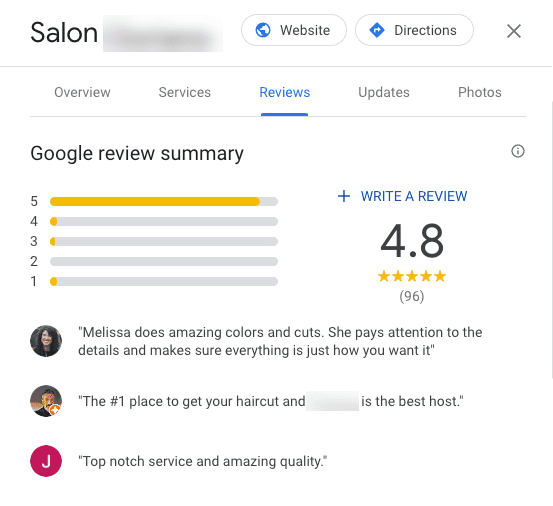
It cannot be overstated that positive online reviews build trust, while negative online reviews can erode that trust. With enough bad reviews on Google, your chance of missing out on new customers increases dramatically, potentially damaging your reputation and your revenue.
The Connection Between Google Maps and Google Reviews
Unless you’re running a business that’s 100% virtual, your business will likely show up on Google Maps. When someone searches for the location of your business, or they look for businesses in a specific area, and yours is among the results, your Google reviews will display along with Google Maps.
The first thing a user will see is your business’ star rating along with the rest of the Google Maps profile. Then, after clicking on your business, they can select the “Reviews” tab, which will open up the reviews page.

It’s helpful to know that your Google Maps result will also display your business’ Google reviews. Otherwise, you might assume that if most customers are searching for your location on Google Maps, they won’t see your reviews at all, and there’s no point in getting rid of harmful ones.
Risks Associated with Negative Online Reviews
There are three major consequences of having negative online reviews about your business. Let’s explore each of them in more detail.
Negative Online Reviews Can Appear on Other Sites
If you don’t get rid of negative online reviews or Google reviews when you have the opportunity to, they can appear on additional websites. This creates a larger problem that’s even harder to get on top of. Before poor reviews get out of hand, respond to them everywhere, whether they’re in the Google reviews section, on social media, or elsewhere.
Bad news travels fast. A negative comment someone publishes on BBB or in Google reviews may suddenly be published on several other review sites, including your company’s social media pages. And if the reviewer has a lot of friends on social media, all of those friends might see the post too.
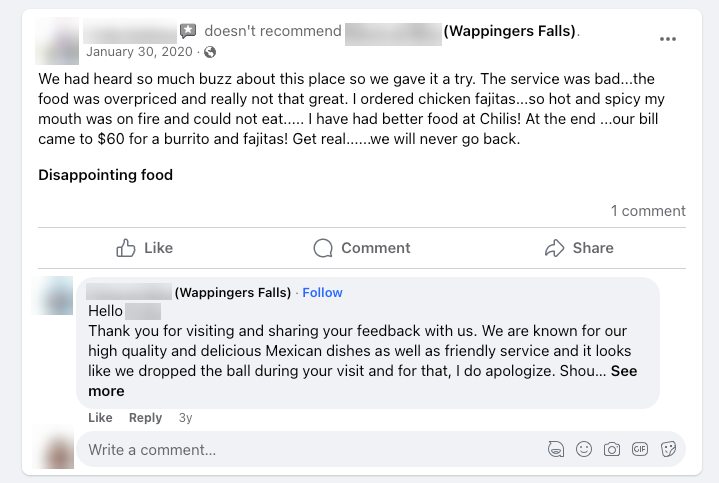
You May Lose Customers Quickly
People tend to choose a company’s services or products based on review websites, including Google reviews. One fake negative Google review or an inappropriate review can cause a chain reaction, and you could lose customers fast. That’s why it’s important to remove negative product reviews or company reviews when the opportunity arises.
For example, let’s say you own a pizzeria. You receive one negative review on BBB regarding your food or customer service. If someone uses the BBB website or app to look up information about your business before ordering, they could see the bad review and decide against going to your establishment.
A perfect example of this is Ripoff Report. With millions of records and high domain authority, this review platform can easily shut a small business down. If you are struggling with a negative article on Ripoff Report entry, contact us today for Ripoff Report removal.

More Negative Reviews May Follow
When one person writes a negative Google review, others generally follow suit. That’s because seeing negative testimonials posted online makes people feel more comfortable about sharing similar experiences.
Unfortunately, many of these unpleasant posts can be fake or fraudulent, and those are the times when you’ll want to try to delete a Google review. Although review sites have protections in place to help prevent the posting of fraudulent, fake or defamatory review content, they are not foolproof.
You cannot prevent any of these from happening, but you can be diligent about spotting false or unflattering reviews and responding to customers promptly or removing negative Google reviews.
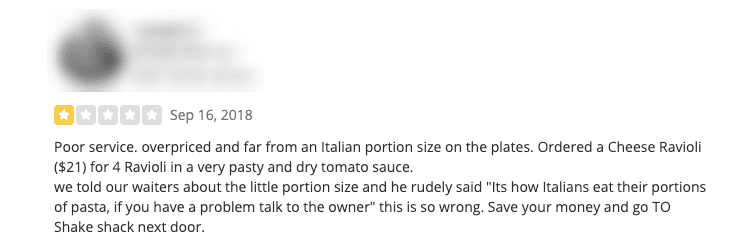
How a Negative Review Removal Service Can Save Your Business
Many business owners don’t understand why they should be worried about the online opinions of customers. On top of that, some business owners believe that nobody will take fake Google reviews seriously, so they don’t put much thought into personal reputation repair or negative review removal.
The truth is that many people rely on online reviews even more than a personal recommendation from a close friend or family member.
Online reviews are your chance to create a first impression. And since you never get a second opportunity to make a first impression, a negative review removal service can be your golden ticket to a 5-star online reputation score.

Source: Brand24
Review management consists of evaluating the current ratings your business has on review sites, including Google, Trustpilot, and the Better Business Bureau. Then, reputation management professionals craft strategies to help you get more positive reviews, respond to reviews, and carefully monitor review platforms to identify emerging trends or potential problems.

Online Reputation Management: Responding to Negative Reviews
Usually, when people criticize companies on review sites, they do so because they want to be heard. The most detrimental thing you can do is neglect them.
Ignoring unfavorable Google reviews and comments suggests to both the individual who posted the negative content and to the potential consumers reading it that you don’t care about them or their experiences with your brand. That’s why we recommend that you always reply professionally and sensitively, both on social media and to Google reviews, as this is the best way to shift a negative into a positive.
Even a simple response can change negative comments into positive reviews or sentiments.
5 Tips for Responding to Bad Reviews

Here are a few expert tips for responding to bad reviews:
- Respond ASAP. Don’t wait to deal with negative Google reviews. You want customers to know you take their concerns seriously.
- Always maintain a professional tone, even if the person who left the review is crass.
- Own up to any mistakes your business made. It’s important to take responsibility for where you went wrong.
- Offer to make things right. It’s less costly to your business to offer a refund or a gift card than to lose the customer entirely.
- Thank reviewers for providing valuable feedback. Any and all commentary helps you better serve your customers.
You can learn more about responding to negative reviews here.
Important Components of Online Reputation Management

With so many people turning to Google search and Google reviews to learn about businesses before making purchasing decisions, a single unflattering review can keep customers away from your door or push them to other companies that you compete with. That’s why review management and monitoring are important aspects of the modern digital environment for company owners.
These management and monitoring strategies are typically part of a more comprehensive online reputation management (ORM) campaign. In ORM, reputation specialists use several strategies, including:
- Content Creation: Developing and publishing positive content pushes negative results down in online searches.
- Building Web Properties: These include social media profiles, blogs, websites, and business directory listings.
- Reputation Monitoring: It’s important to identify emerging reputation threats before they can cause damage.
NetReputation and its team of experienced reputation professionals have helped thousands of people manage reviews, repair reputations, and build brand awareness.
How Do I Delete Google Reviews?
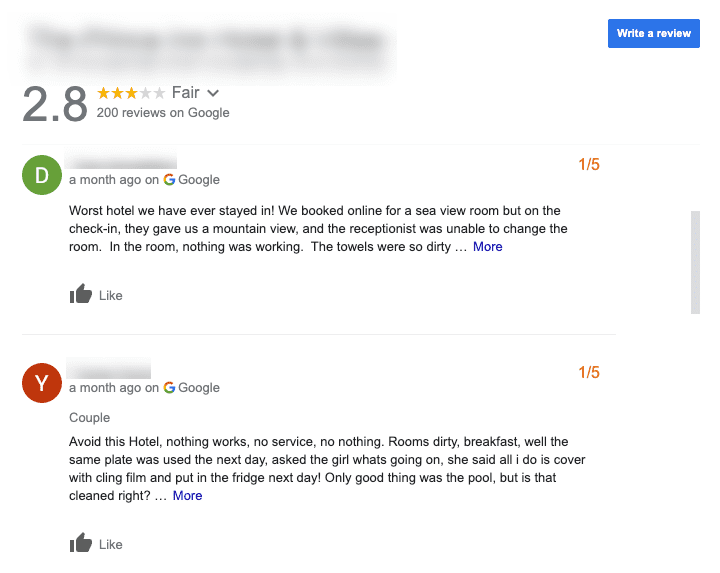
Any bad Google review must be considered for removal. To start this process, conduct a Google search for your business listing, as well as any important industry-related keywords that consumers may search for. By Googling yourself or your business, you have the chance to observe which Google reviews appear about you online and see which are the most concerning among them.
If you’ve ever examined your search results, you may have encountered a range of poor Google reviews. Rest assured that you’re not the only one. This has happened to plenty of businesses and individuals, including reputable ones.
Remember that if you can see bad reviews, so can your clients and potential customers. The higher the position of the review, the more likely it is that it will be viewed by others.
Before you choose to take action and delete a Google review or use a negative review removal service, take the opportunity to read each one of the reviews and determine what’s going on. Perhaps people have a legitimate complaint or accusation and are informing you of something that you need to hear or have been too busy to notice. Or, maybe they are addressing difficulties that you should have fixed some time ago.
Poor reviews may also come from a disgruntled ex-employee or businesses in competition with yours. Whatever the case, it’s time to start working toward a sustainable solution to delete Google reviews that are causing harm.
To delete a Google review, you’ll need to submit a request to Google. You can do that on this page.
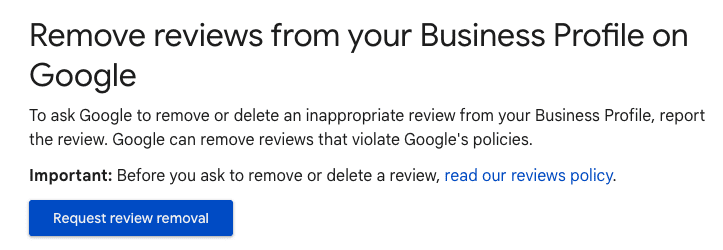
How To Turn Negative Reviews Into Positive Ones
When it comes to poor business reviews, here are three leading questions that many business owners have:
- How do you remove a negative review?
- Can I remove a bad review on Google?
- How do I remove a bad review on the BBB?
Beyond these concerns, though, knowing how to turn a bad review into a positive one is possibly even more important.
The fundamental idea is that you have to acknowledge disgruntled customers as quickly as possible. The faster you are able to discuss the situation, the more flexible their position will be. Customers expect businesses to be liable for what they do and what their employees say. You should not ignore the situation or put the blame elsewhere. Instead, immediately acknowledge that you could have performed better.
- Check that you have all the appropriate data on hand, and begin by addressing any concerns or misunderstandings. Make sure to leave a personal response, as that gives consumers the confidence that you are engaged with them.
- Always ask relevant questions. You’ll be able to genuinely learn from the situation and prevent further problems down the road. Keep questions open-ended, allowing consumers to effectively communicate what they truly think and want from your business.
- Recognize that the customer is always correct — even when they’re not. While the reviewer may be technically wrong, their belief is true to them. You have to speak to them in these terms so you can get them on your side. Otherwise, they’ll become defensive, and it’ll be hard to win them over at that point.
Unfavorable Google reviews are a learning opportunity, pointing to areas of your business that can be improved. Smart owners know that even if reviews are less than favorable, they provide critical feedback to make your operation run more smoothly. This will give you the best chance of converting a disgruntled customer into one who will return to your business and spread positive word-of-mouth marketing.
More Advice About How To Remove Negative Online Reviews
Even under the best of circumstances, most companies will face unflattering ratings or less-than-favorable Google reviews at some point. The internet can be a challenging place to do business; consumers have a wide range of tools and platforms for sharing their experiences. Third-party review sites like Trustpilot and Google have become extremely popular and feature prominently in search results.
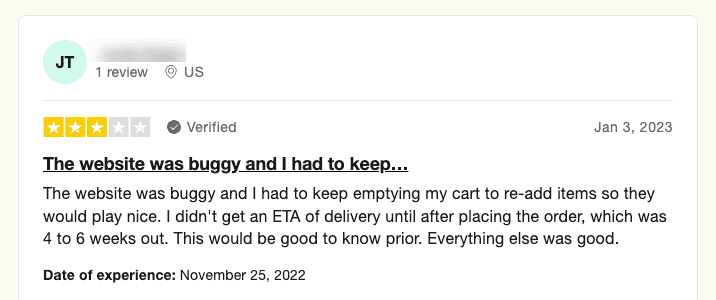
To get rid of bad reviews, you first have to understand that not all review platforms will agree to take those reviews down unless you can prove they are false. For third-party sites that have contact information posted, you can request that reviews be removed. Site owners are under no obligation to agree, but this tactic is worth a try.
If that doesn’t work, a reputation management company like NetReputation can help. Our removal experts work closely with each client. And we have a strong track record of removing reviews that harm an individual’s or company’s reputation.
How Can I Remove Fake Reviews?
A growing concern for business owners is the increase of false reviews posted by people who did not even visit the business in question. In some cases, these fake reviews share false, misleading or defamatory content. Any time this occurs, negative content can appear in an online search for your business.
Luckily, false reviews are easier to deal with than other types of poor reviews. Most review platforms give businesses the ability to flag false reviews for removal. In other cases, filing a takedown request with the site owner often works.
Our 4-Step Approach to Removing Negative Reviews
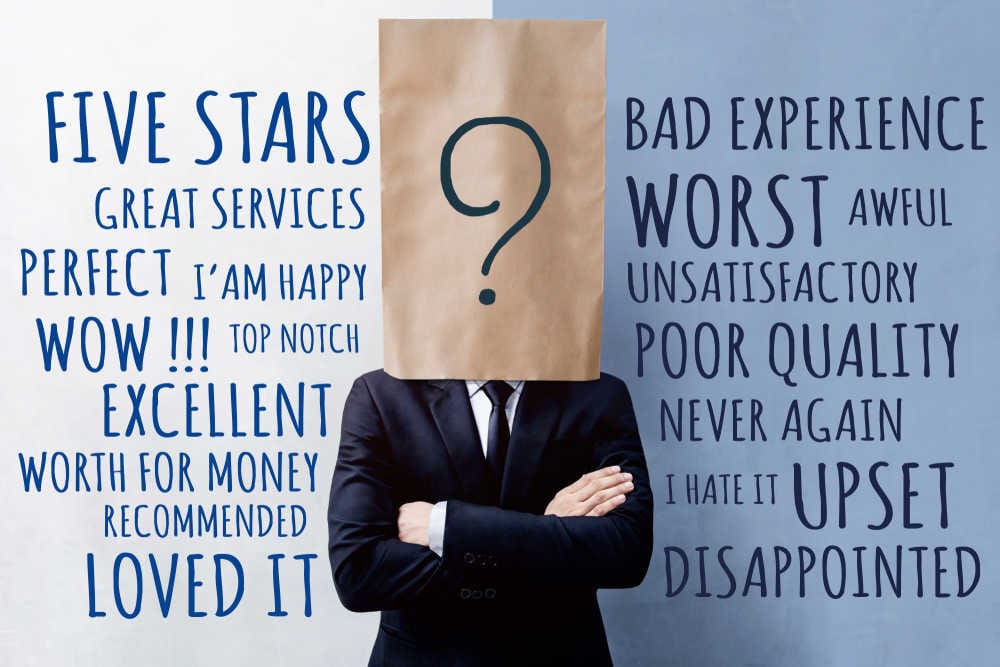
Two of the questions that people ask us most often are:
- “Can I remove a bad review on Facebook?”
- “How can I replace negative Google reviews with positive ones?”
Over the past decade, our online reputation management team has devised the perfect service for removing poor reviews. Here is our four-step approach to help you remove bad Google reviews:
- Discover if there is anything you can do to fix the most common and legitimate complaints, then resolve those issues.
- Remove reviews that are fraudulent, derogatory or slanderous. Be careful not to delete genuine complaints. You don’t want to inadvertently anger honest reviewers and cause them to leave more negative reviews elsewhere.
- Reply to all real comments — whether they are good reviews or negative ones — while being professional and polite.
- Fill the internet with positive content about yourself or your business. This happens by developing online platforms (websites, social media profiles, etc.), creating content, and encouraging positive reviews.
Once you understand how drastically a negative Google review or bad feedback on sites like BBB can harm your reputation, it may be time to call a reputation management company. The online reputation experts at NetReputation offer professional services to help you with negative review removal and the suppression of articles that damage you or your company’s name. We can help you restore your reputation and take back control of your web presence.
Review Removal with NetReputation
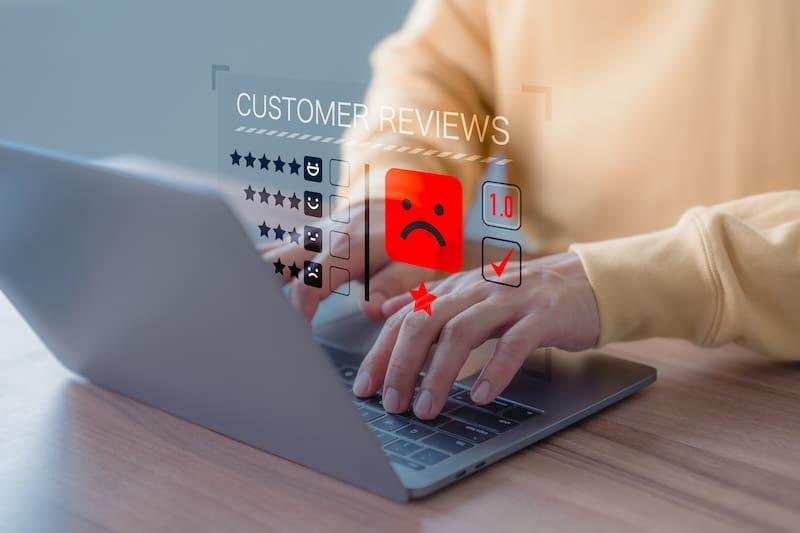
If you’re dealing with negative online reviews or a brand crisis, you may need online reputation management services to remove a negative online review.
NetReputation is the leading online reputation management services provider. We have helped thousands of clients take charge of their online presence, allowing them to overcome the damage that poor reviews can have on their business prospects.
After an initial consultation, our team will develop a plan to remove the reviews that are harming your company. Review removal is not the only tactic we use; review management is another valuable service that can help you control exactly what others are saying about you.
Finally, monitoring for emerging threats — including new reviews that put your company in a negative light — can keep your reputation strong.
Contact NetReputation Today
If reviews are harming your prospects online, we can help. NetReputation is ready to help you remove false reviews, monitor review platforms, and create strategies to protect your hard-earned online reputation. Contact Net Reputation today at 844-461-3632 for a free consultation or fill out the form below. One of our representatives will respond promptly.
Updated 12/2023
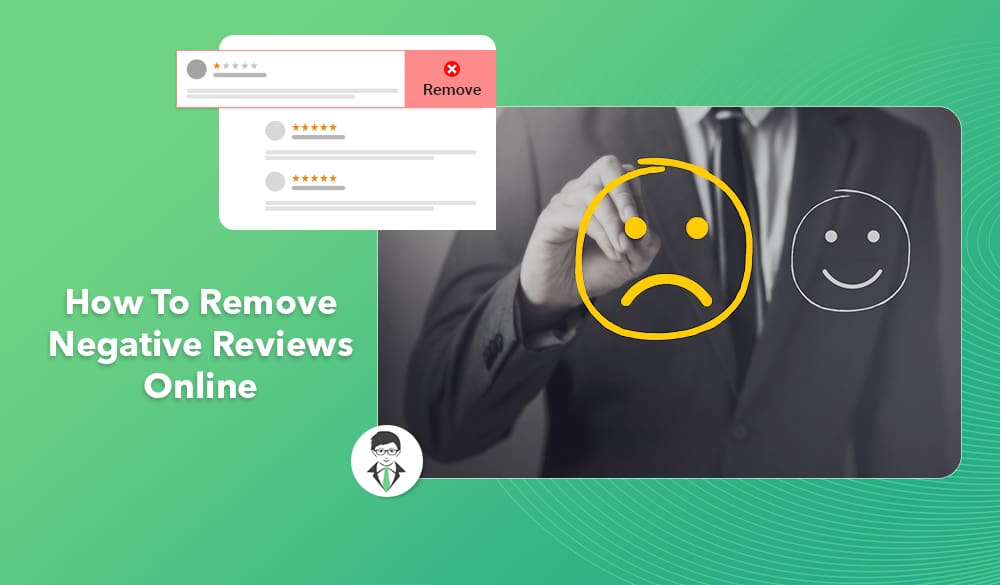

very important for businesses
I especially liked the section on how to respond to negative reviews professionally. This is a must-read for any business owner!
Bad reviews can really harm a businesses reputation. Reviews and ratings in the era of the Internet are everything!
Detailed article with so many gems on online reviews and how it affects your business or reputation.
Effective strategies for removing negative reviews, invaluable insights provided.
The insights on managing and transforming negative reviews into positive outcomes were enlightening. It’s crucial to see these reviews not just as criticisms, but as opportunities to improve business practices and customer relations. The strategies discussed for responding to and potentially removing unfair negative reviews while promoting positive feedback underscore’s the importance of active reputation management. It’s a reminder of how vital a positive online presence is for the success of a business.